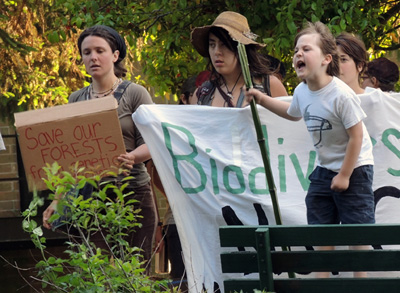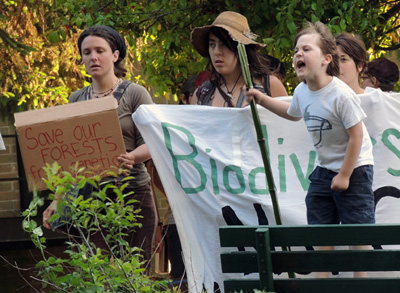
 Protestors sent a clear message to the GE tree industry and its investors – expect resistance. (Photo: Langelle/photolangelle.org for GJEP)Protests are raging outside of a biotechnology conference in Asheville, North Carolina, where demonstrators are voicing opposition to proposals to grow genetically engineered eucalyptus trees across the southeastern United States.
Protestors sent a clear message to the GE tree industry and its investors – expect resistance. (Photo: Langelle/photolangelle.org for GJEP)Protests are raging outside of a biotechnology conference in Asheville, North Carolina, where demonstrators are voicing opposition to proposals to grow genetically engineered eucalyptus trees across the southeastern United States.
Hundreds of demonstrators marched outside the Tree Biotechnology 2013 conference on Tuesday, and organizers said the protest was the largest against genetically engineered trees yet. On Monday, two Asheville residents were arrested after disrupting a presentation at the conference, according to a release from activist groups.
The protests come just days after an estimated 2 million people joined protests against biotech giant Monsanto in countries across the world.
Two major sponsors of the biotechnology conference in Asheville, FuturaGene and ArborGen, have proposed to introduce genetically engineered eucalyptus trees for commercial cultivation in the United States and Brazil. The trees would be burned as a source of biomass energy.
The United States Department of Agriculture (USDA) is currently considering a petition to allow the planting of ArborGen’s eucalyptus trees, which are genetically engineered to tolerate freezing temperatures so the trees can be grown in the southeastern US and other climates that can be too cold for normal eucalyptus.
Opponents say the tropical, genetically altered trees would threaten native species and turn forests into mono-crop fuel generators.
“ArborGen is genetically engineering non-native eucalyptus trees to be freeze tolerant to feed ethanol refineries and biomass burners under the umbrella of climate mitigation,” said Anne Petermann, executive director of Global Justice Ecology Project. “They want to convert biodiverse and carbon-rich forests into vast plantations of invasive, flammable and water-draining eucalyptus trees. This will be a disaster for the climate.”
ArborGen says the genetically engineered trees would have a “very large and positive impact” on the commercial forestry industry by allowing foresters to plant tropical eucalyptus over a much greater area of the United States, according to the company’s web site.
The biomass industry has touted wood burning as a greener alternative to fossil fuels that contribute to global warming, but opponents say burning biomass is not a cure for climate change.
Mary Booth, director of the Partnership for Policy Integrity, told Truthout that wood burns less efficiently than major fossil fuels.
“Burning wood for energy emits one and a half times the carbon dioxide of coal per unit energy, and displacing native forests with plantations liquidates even more forest carbon into the atmosphere,” Booth said.
A workshop on genetically engineered trees held by FuturaGene was dominated by discussions on what to do about the public opposition to forest biotechnology, according to protest groups. Protests are expected to continue at the conference, which will be held through June 1.
Join us in defending the truth before it’s too late
The future of independent journalism is uncertain, and the consequences of losing it are too grave to ignore. To ensure Truthout remains safe, strong, and free, we need to raise $46,000 in the next 7 days. Every dollar raised goes directly toward the costs of producing news you can trust.
Please give what you can — because by supporting us with a tax-deductible donation, you’re not just preserving a source of news, you’re helping to safeguard what’s left of our democracy.